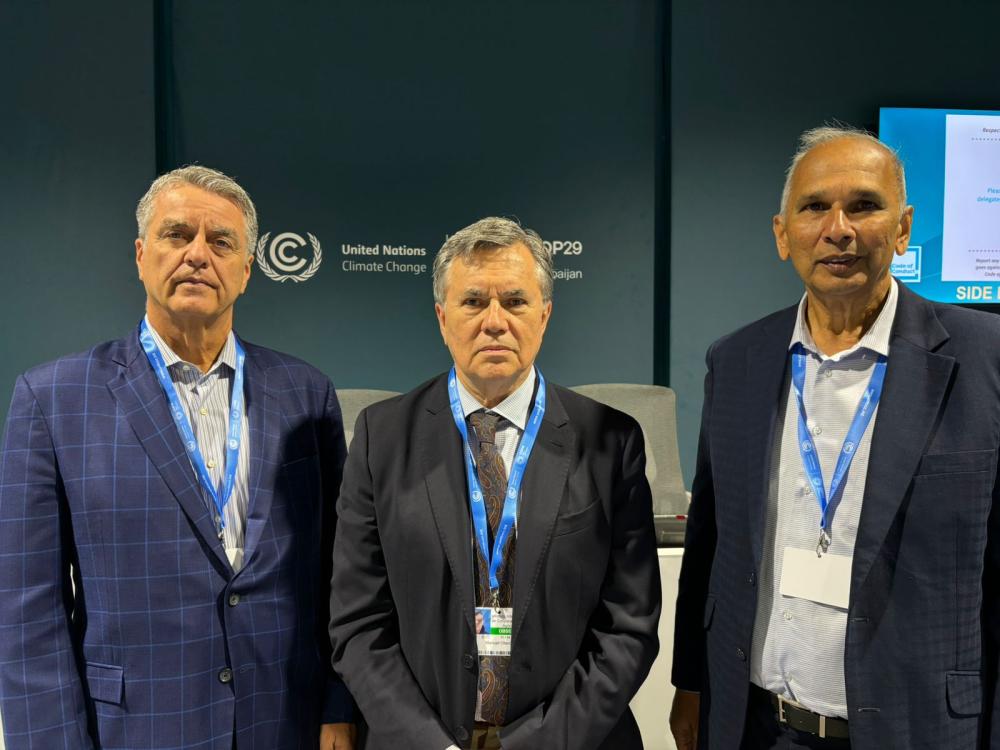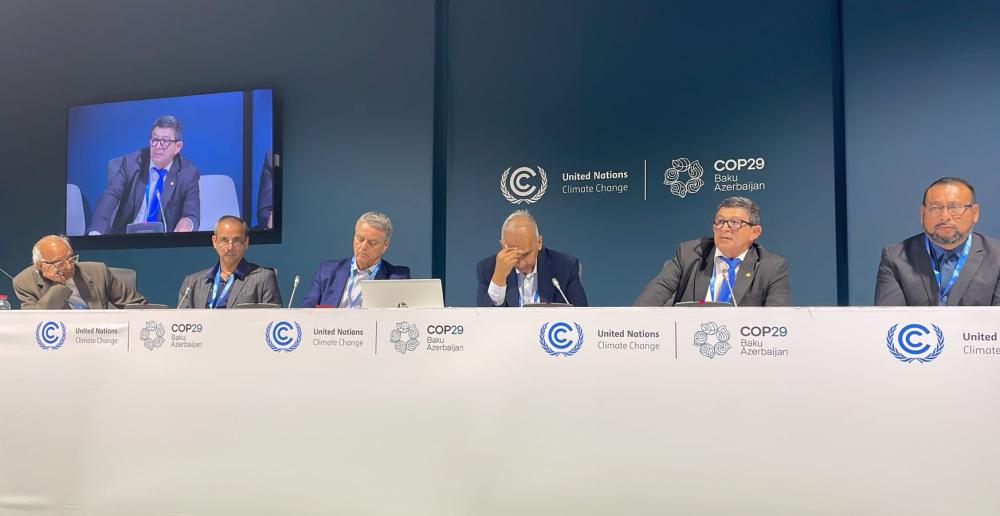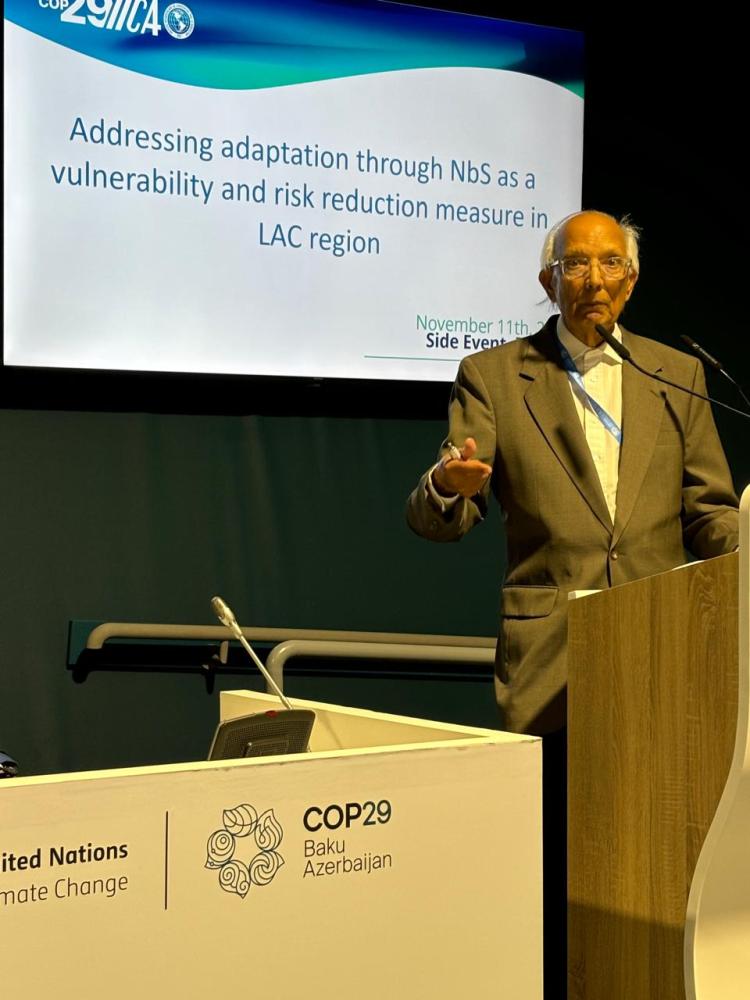The production and livelihoods of farmers in Latin America and the Caribbean are affected by droughts, flooding, hurricanes and other events that are increasingly frequent and severe. In this context, nature-based solutions and innovative financial schemes have been effective in increasing adaptation to these phenomena and mitigating damage and losses.

Baku, Azerbaijan, 12 November 2024 (IICA) – At the opening of COP 29, the countries of Latin America and the Caribbean demonstrated agriculture’s potential to employ nature-based solutions to tackle the challenges of the climate crisis and the increasingly frequent and severe extreme climate events.
The official event at the United Nations Climate Change Conference—which was attended by thousands of persons in Baku, Azerbaijan’s capital city—saw the region showcasing the advances made to reduce its vulnerability to extreme weather events and to bolster the resilience of agricultural production, which is vital for global food security.
COP29 is the premier global environmental forum, where countries discuss and negotiate their commitments to transform their modes of production and consumption.
The panel discussion was organized by the Inter-American Institute for Cooperation on Agriculture (IICA), in partnership with the Tropical Agricultural Research and Higher Education Center (CATIE) and RCC Caribbean, an organization created within the framework of the United Nations Framework Convention on Climate Change, to support small island states, which are particularly vulnerable.
The panelists were scientist Rattan Lal, who is considered the world’s leading authority on social sciences; José Abelardo Mai, Minister of Agriculture, Food Security and Enterprise of Belize; Roberto Azevedo, former Director General of the World Trade Organization (WTO) and a member of the Group of Producing Countries of the Southern Cone (GPS); Luis Pocasangre, Director General of CATIE; Alejandro Martínez, Director of Water-Smart Agriculture for the Catholic Relief Services agency; Clifford Martínez, Coordinator of Water Management in the Ministry of Agriculture of Belize; and Manuel Otero, Director General of IICA.
The moderator was Muhammad Ibrahim, Director of Technical Cooperation of IICA.
Introducing incentives for farmers

The production and livelihoods of farmers in Latin America and the Caribbean are affected by droughts, flooding, hurricanes and other events that are increasingly frequent and severe. In this context, nature-based solutions and innovative financial schemes have been effective in increasing adaptation to these phenomena and mitigating damage and losses.
Rattan Lal, who has been piloting the Living Soils of the Americas program since 2020, in collaboration with IICA, insisted that producers must be motivated to adopt best practices that increase agriculture’s role in resolving climate change issues.
“Paying for soil carbon sequestration would be an excellent measure. The 700 million farmers in the world deserve to receive a fair price for the contribution that they make. This is not an impossible task.How will we pay for it? Some of it could come from the tobacco industry and some from the private sector. The rest of society can also contribute. There are 8.2 billion people in the world, and we all have an immense responsibility to the planet”, said Lal, who is an IICA Goodwill Ambassador and was named 2020 World Food Prize laureate for his extraordinary contributions to food security.
“Farmers are the leading players in production and environmental care, and therefore we must pursue public policies that compensate them”, he added.
Robert Azevedo stressed the fact that climate change solutions should be implemented at a mass level. “The actions of one country or region do nothing to move the planet’s needle. We must adopt a global approach with the entire world on board. Otherwise, our efforts will be useless”, he argued.
Azevedo—a seasoned professional, who has also occupied important positions in the private sector—warned that the transition to a global economy will not come without costs. He pointed out that, “True financing will not come from donations or grants, but from incentives and regulations. As such, it is essential that we create a true global carbon market”.
Azevedo also reflected on the role of agriculture as a solution. Agriculture is the only sector that can sequester carbon. Are we going to make use of it or are we going to continue blaming it? We must bring it on board by being intelligent and creating an economic equation that can effectively take control of this transition”.

Minister Mai spoke about major advances in adaptation in Belize, a Central American country whose coastline is on the Caribbean Sea, where the impact of climate change is a daily reality.
He noted that, “Our country’s economy depends greatly on the agriculture sector. In livestock production, we have made progress in identifying forage and breeds of animals that are tolerant to the harsh conditions that we are experiencing. We have invested in areas such as tree planting and new water storage technologies and irrigation systems”.
Pocasangre spoke in detail about how CATIE is implementing nature-based solutions in Guatemala, El Salvador and Honduras, based on a keen understanding of local demands. He noted that, “We can improve climate change adaptation, by thoroughly assessing the situation of each community and recognizing the limitations. There is no one-size-fits-all solution for all regions and countries”.
On the other hand, Muhammad Ibrahim pointed out the cases in which response to climate events and the building of resistance had demonstrated the strength of agriculture in Latin America and the Caribbean, where the sector is not only a pillar of food security, but also a critical element of economic and social development.
According to Manuel Otero, there are two paradoxes in the region. The first is that it is the leading food exporting region in the world but also the most vulnerable to climate change impacts. The second is that Latin America and the Caribbean has the world’s largest share of natural resources; yet receives limited international financing for environmental conservation.
He explained that, “Our agriculture sector is in the process of transformation. We need a new generation of public policies that will accelerate that transformation, using solutions that are nature-, science- and innovation-based and that give farmers a leading role”.
In conclusion, he stated that, “Of course, agricultural transformation is already underway in our region, and we are moving as fast as we can. However, our farmers need to be given greater access to financing and new technologies to further speed up the process”.
More information:
Institutional Communication Division.
comunicacion.institucional@iica.int
